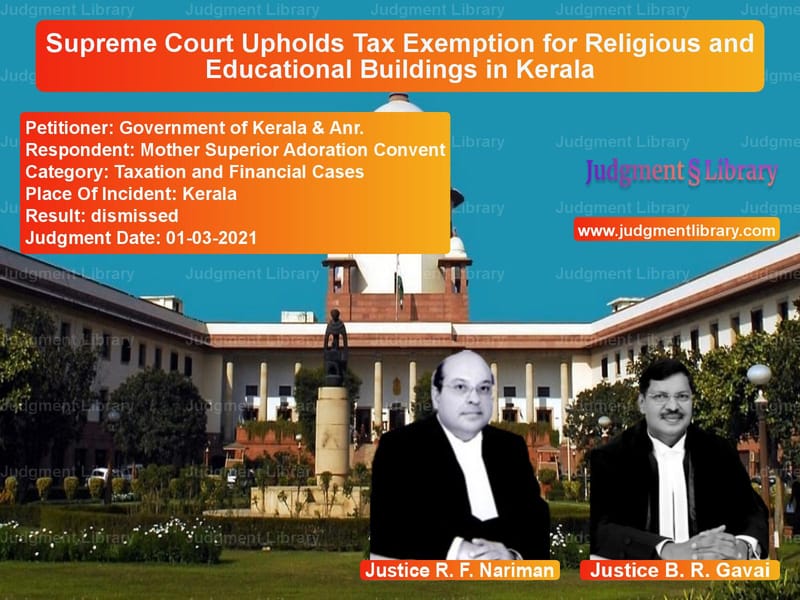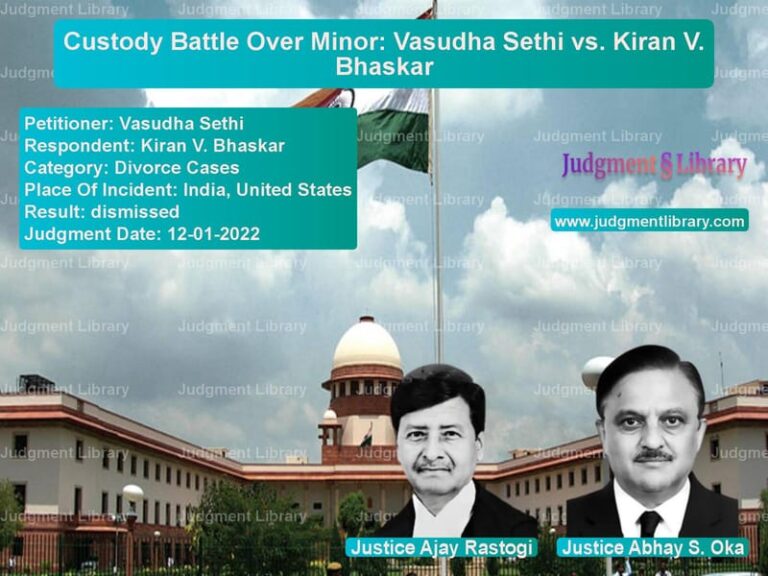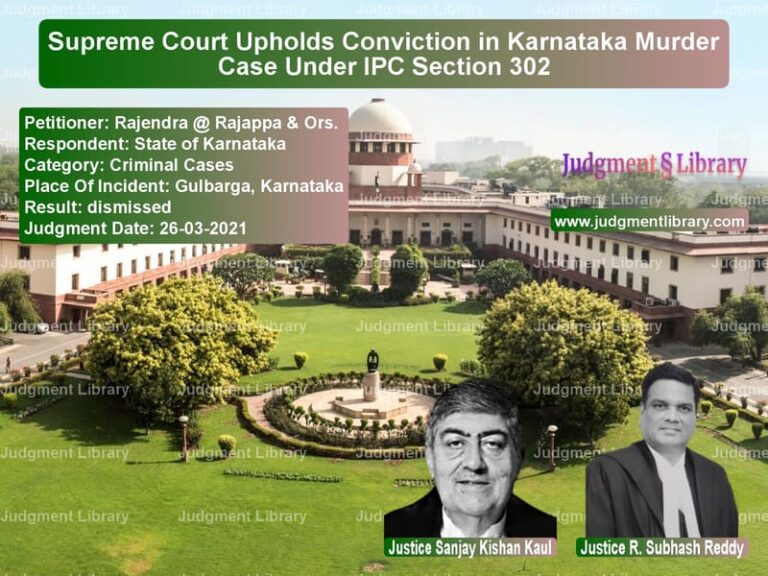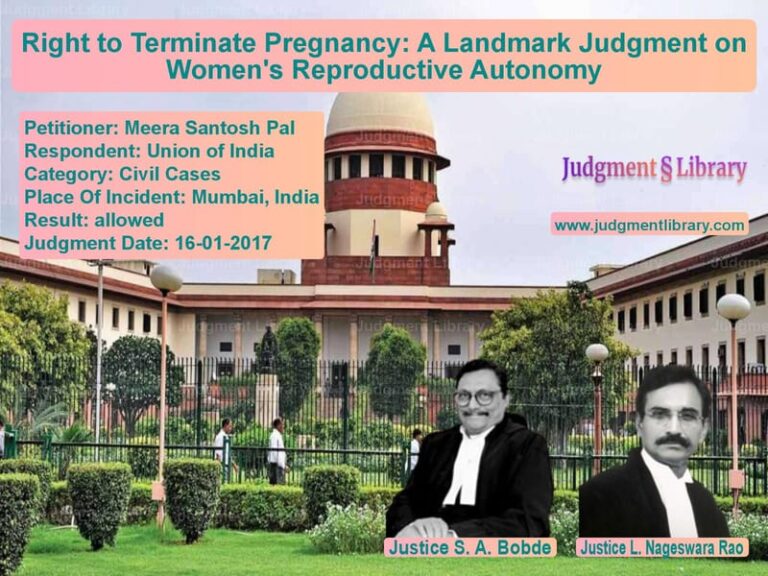Supreme Court Upholds Tax Exemption for Religious and Educational Buildings in Kerala
The Supreme Court of India has delivered a landmark judgment in the case of Government of Kerala & Anr. v. Mother Superior Adoration Convent, along with other related appeals, regarding the exemption of religious and educational buildings from Kerala’s building tax under the Kerala Building Tax Act, 1975. The case revolved around whether residential accommodations for nuns and hostel facilities for students attached to educational institutions qualify for tax exemption.
Background of the Case
The Kerala Building Tax Act, 1975, under Section 3(1)(b), provides exemptions for buildings used “principally for religious, charitable, or educational purposes.” The State of Kerala contended that residential buildings for nuns and student hostels do not fall within this definition, arguing that they primarily serve residential rather than religious or educational functions.
Arguments by the Appellant (Government of Kerala)
The State of Kerala, represented by Senior Advocate Jaideep Gupta, put forth the following key arguments:
- Tax exemption should be interpreted strictly and should not extend to residential accommodations that do not directly serve religious or educational activities.
- The residential buildings for nuns and hostels for students were used primarily for residence rather than religious or educational activities, making them ineligible for exemption.
- Even if the residents (nuns or students) were involved in religious or educational activities, the buildings themselves were not used for these purposes in the primary sense.
- Any ambiguity in the tax exemption provision must be interpreted in favor of the State rather than the taxpayer.
Arguments by the Respondents
The respondents, including religious institutions and educational bodies, argued that:
- Buildings housing nuns and students were integral to their religious and educational purposes, as they provided necessary accommodation for individuals engaged in these activities.
- The exemption should be interpreted in line with its objective—to promote religious, charitable, and educational institutions.
- Restricting the exemption to only the physical places of worship or classrooms, while excluding accommodations essential for their functioning, would be an incorrect interpretation of the law.
- The Kerala High Court had already ruled in favor of these exemptions in multiple judgments, and there was no reason to depart from this precedent.
Supreme Court’s Observations
The Supreme Court, led by Justices R.F. Nariman and B.R. Gavai, made critical observations on the nature and purpose of the exemption under the Kerala Building Tax Act:
“A reading of the provision would show that the object for exempting buildings which are used principally for religious, charitable, or educational purposes would be for core religious, charitable, or educational activity as well as purposes directly connected with religious activity.”
The Court noted that residential accommodations for nuns and student hostels were integrally linked to religious and educational purposes. It distinguished between cases where buildings were used for commercial rentals and those where they were essential to the religious or educational institution’s functioning.
Supreme Court’s Verdict
The Supreme Court ruled in favor of the respondents, upholding the Kerala High Court’s earlier judgments and affirming the tax exemptions. Key takeaways from the verdict include:
- Buildings used as accommodations for nuns in religious institutions qualify for exemption as they facilitate religious activities.
- Hostels attached to educational institutions also qualify for exemption as they provide essential living space for students, without which the institution could not function effectively.
- The government’s argument that exemption provisions should be interpreted narrowly was rejected. Instead, the Court emphasized a purposive interpretation that aligns with the legislative intent of promoting religious and educational institutions.
- The appeal filed by the Government of Kerala was dismissed, reinforcing the tax exemption for such institutions.
Conclusion
The Supreme Court’s decision in this case sets an important precedent in interpreting tax exemptions for religious and educational institutions. By reaffirming that accommodations essential to these institutions’ operations qualify for exemption, the judgment ensures a broader, more purpose-driven application of the law. This ruling is expected to have a lasting impact on similar tax disputes in Kerala and other states with comparable tax exemption laws.
Petitioner Name: Government of Kerala & Anr..Respondent Name: Mother Superior Adoration Convent.Judgment By: Justice R. F. Nariman, Justice B. R. Gavai.Place Of Incident: Kerala.Judgment Date: 01-03-2021.
Don’t miss out on the full details! Download the complete judgment in PDF format below and gain valuable insights instantly!
Download Judgment: government-of-kerala-vs-mother-superior-ador-supreme-court-of-india-judgment-dated-01-03-2021.pdf
Directly Download Judgment: Directly download this Judgment
See all petitions in Income Tax Disputes
See all petitions in Tax Refund Disputes
See all petitions in Banking Regulations
See all petitions in Judgment by Rohinton Fali Nariman
See all petitions in Judgment by B R Gavai
See all petitions in dismissed
See all petitions in supreme court of India judgments March 2021
See all petitions in 2021 judgments
See all posts in Taxation and Financial Cases Category
See all allowed petitions in Taxation and Financial Cases Category
See all Dismissed petitions in Taxation and Financial Cases Category
See all partially allowed petitions in Taxation and Financial Cases Category







